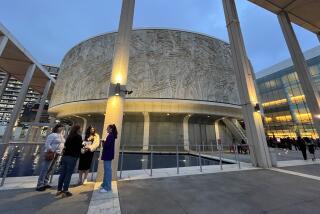Taper Rush Now More Relaxed
Rush hour is earlier--and a little more costly--than it used to be at the Mark Taper Forum.
Center Theatre Group’s public rush program now offers $12 Taper tickets two hours before the show begins. Until the Taper season began last month, the rush tickets cost $10 and went on sale just 10 minutes before curtain time.
Jim Royce, CTG’s marketing and communications director, cited several reasons for the changes.
The 6 p.m. weekday time for the opening of the rush line is more convenient for the downtown workers who are among the likeliest to buy rush tickets, Royce said. It gives them time to eat dinner after buying tickets, instead of waiting in line in the period just before the show. However, people who don’t work nearby shouldn’t feel completely outrushed, because they have an equal opportunity to obtain rush tickets before the Saturday matinees, when sales start at 12:30, and the Sunday evening performances, when the rush begins at 5:30. Rush tickets aren’t offered for Saturday evenings or Sunday matinees.
For the CTG, the more relaxed atmosphere of a two-hour rush instead of a 10-minute one gives the box-office staff the time to take the buyers’ names and addresses, so they can receive future CTG mailings.
Royce said this was a good time to make the change because “Rent,” currently at the Ahmanson, is continuing its tradition--first established in New York--of selling $20 tickets to 28 seats in the first two rows, two hours before curtain. “It’s easier to explain if both theaters do a rush at the same time,” Royce said. After “Rent” leaves, the Ahmanson will adopt the same rush policy as the Taper--$12 tickets, two hours in advance.
The idea of thinning the crowd scene outside the Taper before curtain time was not a factor in the change, Royce said, for in fact artistic director Gordon Davidson “loved to see those lines out there.” Having a rush line next to the will-call line helped create the appearance of a hot show. But apparently the advantages of an earlier rush outweigh this disadvantage.
For most Taper performances, rush tickets are sold only for the side seating, known as the “B” section. Seats sometimes go empty in the “A” section even though latecomers to the rush line are being turned away because the day’s supply of rush tickets has run out. This creates some complaints--in a letter to The Times last April, for example, Matt Auerbach wrote that after waiting in line 50 minutes for rush tickets, he was told that only full-price tickets remained for a performance of “Valley Song.”
“I was floored,” Auerbach wrote, “that the Taper would rather leave empty seats for a critically acclaimed play than to sell them at the advertised discount rate to people who really want to see the play. . . . Were the Taper a restaurant, would they throw out unused food instead of donating it to the homeless camped outside?”
Yet last-minute ticket buyers are often willing to pay full price for the “A” tickets, Royce said, while the only way to sell the “B” tickets at the last minute is through the rush.
Furthermore, people who showed up early and obtained rush tickets in the “B” section might object if the “A” tickets were suddenly made available at the rush price just before curtain. Or next time, they might just show up later.
There’s also an aesthetic reason for doing whatever is necessary to fill the side sections at the sharply thrust Taper: “It dresses the house, and helps the audience think there are many more people there,” Royce said.
He advised anyone who wants a better chance of obtaining a rush seat to attend previews, when no distinction is made between “A” and “B” seats--they’re all offered at the same price.
As for the $2 rise in the price of rush tickets, which had stayed at $10 since the inception of the program in 1990, Royce said that before-the-hike interviews of rush buyers indicated a willingness to pay a little more, and “so far, there have been absolutely no complaints.”
More to Read
The biggest entertainment stories
Get our big stories about Hollywood, film, television, music, arts, culture and more right in your inbox as soon as they publish.
You may occasionally receive promotional content from the Los Angeles Times.










